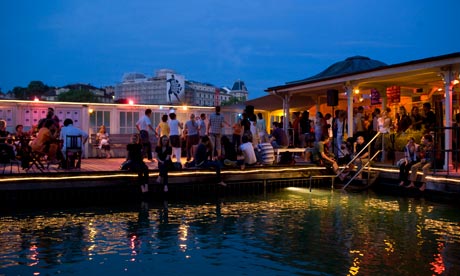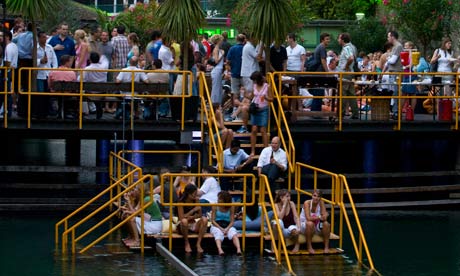Just a chronometrically perfect second – I am still in Switzerland, right? It's 11am on a Sunday, and everyone's semi-naked. Since yesterday, the pleasant spring weather has made way for a 10C temperature hike and Caribbean-issue sunshine. And the locals could not be more ready. As I stroll into Zürich's Arboretum Enge park, overlooked by the magisterial historic headquarters of some of the banks that have helped make this little city one of the world's wealthiest, a 360-degree panorama of prone, lotioned, swimwear-clad flesh wraps around me.
I should own up. I've never quite "got" Switzerland. Not that I'm unimpressed by its thrilling landscapes, pristine streets, pathologically efficient transport system and the occasional, shockingly enlightened, sociocultural example it sets the world (Dada, strong record on gay rights, eminently sane drug addiction policy, the band Yello …). But, given the recessive hedonism gene that makes me always want to discover a place with its hair down, I've always found the land of Heidi a little overly well-behaved, unworldly, closed.
And yet, all around me, perky young folk are flirting heroically and cracking open pre-lunch beers, couples cosy up on beach towels, and hamper-toting groups of friends stake out picnic spots. Where the park's flawless lawn rolls down to the edge of Lake Zürich, sunbathers and kids cool off with ducks and swans in the clear, pale-green water, while smart yachts and launches pepper the horizon and the Alps offer up the last of their snow in the distance.
For many of Zürich's highly cosmopolitan populace, the way to enjoy such a day is at one of the city's 18 thriving lidos, so I hand over my 7 Swiss francs (£5.50) to get into Seebad Enge, favourite of the well-groomed thirtysomething set. And quickly wonder why I bothered. There's barely a scrap of space to sit, let alone bask, on this modest pontoon on the lake. But I soon realise I've missed the point. For the Seebad Enge crowd, their lido is for chatting, showing off their latest beachwear and tattoos, a simple Mediterranean-style brunch from the cafe, and checking each other out.
As bathing culture goes, Zürich has quite a pedigree – 1837 saw the opening of its first lido, now a gorgeous, art nouveau wooden cloister on stilts over the Limmat, one of the city's two rivers. Now as then for women only, the Frauenbadi was followed by open-air swimming spots that cater to audiences from sports nuts to wellness aficionados to beach bums to party people looking for chilled-out beats and an afternoon cocktail or two.
And still it grows. This morning, I've already spent a couple of dreamy hours at the brand-new Thermalbad & Spa (thermalbad-zuerich.ch), a sleek public oasis incorporating the 100-year-old stone arches of a stunningly converted former brewery, and fed by one of Zürich's two hot springs. The journey it recommends through a series of pools, hot rooms and showers is relaxing, the Turkish bath-style hydro-massage invigorating, but it is the glorious rooftop infinity pool with its wraparound views of the city's whimsical spires and chichi hillside suburbs that makes the biggest impression. (The B2 boutique hotel will complement the spa from next spring.)

Barfussbar
By night, many of Zürich's lidos take on new life, and together add up to the most distinctive and charming feature of the city's expansive and sophisticated after-dark offering. Come 8pm, the Frauenbadi reopens as the Barfussbar (barefoot bar), open to men and women, and hosts live music, dance nights and literature readings. At Oberer Letten, the Pier West bar takes over, entertaining a twentysomething crowd with relaxed dance music and dining from the neighbouring restaurant, Primitivo, while downriver Unterer Letten screens films for two weeks each summer.
Then there's Rimini Bar, night-time alias of Flussbad Schanzengraben, the city's men-only lido, where I start my night out. Cocooned from the busy streets by ivy-trailed ancient city fortifications and tall trees whose shade turns the water a deep turquoise, it is given a nightly makeover with fairy lights, rugs and floor cushions, and is a seductive and convivial place to sip and snack away an evening.
But I've come to explore the city's new frontier, its wild west, and as Rimini Bar starts to hit its Saturday-night stride, I set off for the suburb of Langstrasse. Sent into spiralling decline by the death of local industry in the 1980s, and still very evidently the centre of a red-light industry that's bigger than either Hamburg's or Amsterdam's, this residential district built by and for migrant workers in the late 19th century is now home to some 140 nationalities. Right now it's cresting a wave of gentrification that makes it the liveliest and most eclectic neighbourhood in town.
Langstrasse's slightly shabby but pleasant streets throng with restaurants serving cuisine from all over the world and bars that range from traditional to fashion-forward (arthouse cinemas Xenix and Riffraff both have buzzing bars), all charging significantly less toe-curling prices than in the city centre. Its hipster hub is Josefstrasse and the neighbouring streets – where pedestrianised blocks become informal piazzas by night – are lined with cool, quirky bars and stylish but unpretentious eateries. Alfresco dining and drinking, sometimes with live music, take over the area, subsiding after midnight when people head home or to a club, of which Zürich boasts the largest number per capita in Europe.
Beyond Langstrasse lies Zürich West, a former industrial zone that's in the process of a bold transformation. In Zürich's boom industrial years in the first half of the 20th century, turbine manufacturer Escher Wyss owned this 17-hectare plot, and so daunting is the scale of its broad thoroughfares, colossal railway bridges and monumental factory shells that only in the last few years has the city been ready to mount a concerted effort to reclaim, reinvent and integrate the area.

Rimini Bar
While the plan is for boho-luxe loft-style living and versatile creative workspaces to gradually build new residential and professional communities here, for the visitor the main draws are the site's imposing topography and the imaginative uses being made of its unique features. The Schiffbauhalle, a vast ship-building hall, has been handsomely converted into a theatre, jazz club and the highly regarded LaSalle restaurant. The Viadukt project has brought together 60 independent, design-skewed retailers in repurposed railway arches, while a nearby column of well-worn shipping containers is the flagship store of Freitag, a local brand which makes achingly hip bags and accessories from recycled industrial materials. Meanwhile, the move to Zürich West of Eva Presenhuber's cutting-edge contemporary art gallery is seen by the art world as a significant seal of approval. But atmosphere? While the area positively reeks of exciting potential and there's no shortage of smart bistros and bars to visit of an evening, for now chances are you'll have the place pretty much to yourself.
Lured by the sounds of an open-air indie-rock gig, I keep on walking, crossing the Limmat to Wipkinger Park, and decide to wind up my night at a free mini-festival where a couple of thousand people are dancing by the stage or sitting by the river, sipping caipirinhas from the pop-up bar and smoking unusually fragrant cigarettes.
Wandering back towards town at 1am, I discover another niche community for whom Zürich West is already very much up and running. Studiedly discreet, the entrances to this year's fiercest up-all-night clubs for devotees of Zürich's beloved minimal techno – Cabaret, Zukunft and Hive – are starting to harbour queues of excited party kids resplendent in weekend finery. And although I'm quite old enough to know better, my night out is back on. Heidi-nism – it's catching.























Are you in Oslo and did you see what happened? Get in touch and let us know if you witnessed this event. You can send eyewitness accounts using the form below.